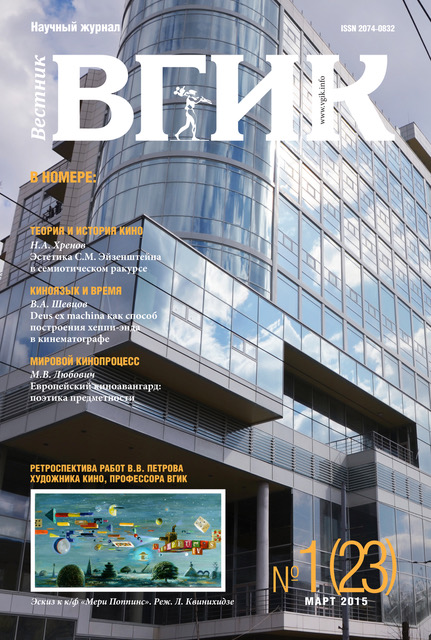Том 7, № 1 (2015)
- Год: 2015
- Статей: 15
- URL: https://journals.eco-vector.com/2074-0832/issue/view/882
- DOI: https://doi.org/10.17816/VGIK71
Статьи
Библиотека ВГИК
 102-103
102-103


ХРОНИКА В ДЕТАЛЯХ | АКТУАЛЬНОЕ СОБЫТИЕ
«Студенческий ТЭФИ» - инновационный проект
 6-7
6-7


ТЕОРИЯ И ИСТОРИЯ КИНО | ЭКРАННЫЕ ИСКУССТВА
Эстетика С.М. Эйзенштейна в семиотическом ракурсе
Аннотация
Статья посвящена семиотическому истолкованию теоретического наследия кинорежиссера С.М. Эйзенштейна, предвосхитившего столь популярную с 1960-х годов структуралистскую методологию. Наследие С.М. Эйзенштейна еще в 60-е годы привлекло внимание академика Вяч. Вс. Иванова потому, что в нем он обнаружил движение в сторону понимания кино как языка или, еще точнее, знаковой системы. Вяч. Вс. не мог не обратить на это внимание, поскольку становление семиотической методологии в России связано с его именем. Естественно, что он не мог не осмыслить и предысторию семиотики искусства. Такая предыстория в сфере кино связана с именем С.М. Эйзенштейна. Пытаясь понять значение исследования Вяч. Вс., посвященного эстетике С.М. Эйзенштейна, автор также касается применения семиотической методологии к кино как знаковой системы. В связи с этим в статье воспроизводится атмосфера увлечения семиотикой отечественными теоретиками кино. Расшифровывая смысл названия книги Вяч. Вс. Иванова о С. Эйзенштейне, автор показывает, что идея семиотики возникла уже на первоначальном этапе становления эстетики как философской науки.
 8-25
8-25


От теории к методологии кино
Аннотация
Статья посвящена обоснованию возможности и описанию перехода от предметно-концептуального теоретизирования в кинонауке, продуктом чего является фрагментарная теория кино, к специальной методологической работе, в рамках которой имеющиеся знаниевые представления проблематизируются, распредмечиваются, нормируются и организуются с учетом онтологии кино как системообразующего элемента кинематографа, рассматриваемого как система деятельности.
 26-36
26-36


Первые на Венере. Космические путешествия в отечественном кино 1930-1960-х годов
Аннотация
Цель статьи - ввести в научный оборот ранее неизвестные архивные документы и экспериментальные съемки, предоставить историкам новый фактографический материал по теме научно-фантастического кино. При обращении к опыту режиссеров, чьи работы не нашли достаточного отклика в отечественной кинонауке, выдвигается гипотеза на основе обширного архивного материала о том, что первый в мировом кино фильм о покорении Венеры был задуман и частично снят в России во второй половине 1930-х годов. Материалы статьи призваны изменить существующие представления о развитии научно-фантастического жанра в мировом кино.
 37-47
37-47


КИНОЯЗЫК И ВРЕМЯ | ГЕНЕЗИС ОБРАЗА
Deus ex machina как способ построения хеппи-энда в кинематографе
Аннотация
В статье рассматривается особый тип хеппи-энда, когда финальное благополучие оказывается своего рода сюрпризом, «подарком судьбы», получаемым независимо от совершенных протагонистом усилий. Такой тип финала отклоняется от логики «классического кинонарратива» и сближается с драматургическим приемом deus ex machina. Показано, что обращение к этому приему выглядит оправданно, если в персонажной системе фильма присутствует антропоморфный представитель дарующих героям счастье «высших сил».
 48-58
48-58


Эволюция мифологического нарратива в картинах Сергея Бодрова-старшего
Аннотация
В статье анализируется творческий путь Сергея Бодрова-старшего в контексте выхода на большой экран фэнтэзи-блокбастера «Седьмой сын», снятого им в США, обосновывается причина органической адаптации творческого кредо российского кинорежиссера в зарубежном кинематографе.
 59-69
59-69


ПЕРФОРМАНС | ИСКУССТВО ВОПЛОЩЕНИЯ
Рефлексия как аудиовизуальная форма мышления в творчестве Александра Сокурова
Аннотация
Статья посвящена рассмотрению звука в кинофильме в контексте понимания эстетики режиссера в авторском кино. Вопрос «что и как делает звук в фильме?» переходит в задачу понимания: «почему так использован звук в фильме?». Проблема рассматривается на примере фильма Александра Сокурова «Одинокий голос человека». Автор статьи предпринимает попытку показать роль шумов, речи и музыки как важной составляющей экранного воплощения экзистенциальной рефлексии режиссера.
 70-81
70-81


КУЛЬТУРА ЭКРАНА | КУЛЬТУРОЛОГИЯ. ФИЛОСОФИЯ
Влияние медиакультуры на современное искусство: фотография, гиперреализм, видеоарт
Аннотация
В статье анализируется проблема изменения восприятия визуального искусства, а также трансформация самого механизма функционирования искусства, возникшая под влиянием развития медиасферы. В качестве примера рассматриваются наиболее популярные жанры современного искусства - фотография, гиперреализм и видеоарт, анализируется новый тип медийного мышления, основанный на рассеянном коллективном восприятии.
 82-91
82-91


МИРОВОЙ КИНОПРОЦЕСС | АНАЛИЗ
Европейский киноавангард: поэтика предметности
Аннотация
В статье внимание уделяется феноменологической дискрипции поэтической природы кинообраза, связанной в европейском киноавангарде с такими первостихиями, как вода и воздух (туман). Исследуется природа происхождения имагинаций художественного сознания в связи с проблемой восприятия и репрезентации реальности в режиссерском методе.
 92-101
92-101


КИНОБИЗНЕС | СТРАТЕГИЯ И ТАКТИКА УПРАВЛЕНИЯ
1992-2012 годы. Попытки приватизации киностудий
Аннотация
В статье рассматриваются изменения, происходившие в имущественной сфере российской киноотрасли под влиянием экономических и политических факторов, а конкретно - речь идет о трансформациях, которым подверглись крупнейшие советские киностудии в постсоветский период.
 104-111
104-111


Прокатные категории фильмов в России: опыт статистического анализа
Аннотация
В статье анализируется динамика статистического распределения посещаемости отечественных кинофильмов в прокате на территории РФ за пятилетний период - с 2009 по 2013 год. Выделяются четыре прокатные категории и шесть подкатегорий для фильмов по уровню их посещаемости в кинотеатрах. Комплексный анализ фильмов, сгруппированных в каждой категории, позволяет сделать выводы относительно возможностей роста абсолютных показателей посещаемости отечественных фильмов и повышения их относительной доли в общем объеме проката.
 112-127
112-127


ТЕЛЕВИДЕНИЕ | ЦИФРОВАЯ СРЕДА
Полиэкран как средство монтажа
Аннотация
Статья посвящена анализу художественных эффектов визуальной интеграции перманентных информационных потоков в телевизионном кадре. На примере полиэкрана представлена идея развития нового метода создания телерепортажа. Выявляется художественный ракурс взаимодействия объектов композиции в двухмерном и полиракурсном кадре.
 128-134
128-134


«Мы» и «другие страны» - их акции и наши реакции
Аннотация
В статье обсуждается природа порождения нашего отношения к другим странам, рассматривается роль информационных каналов, в особенности ТВ, в этом процессе, которые отбором фактов формируют отношение аудитории к «другой» стране. Телевидение занимает в этом ряду особое положение, являясь самым потребляемым россиянами информационным каналом. Информационная политика становится все более зависимой от определенных структур, определенных личностей как непосредственных акторов происходящего.
 135-145
135-145


ЧИТАЛЬНЫЙ ЗАЛ | РЕЦЕНЗИЯ
 146-151
146-151













